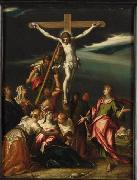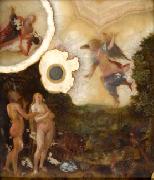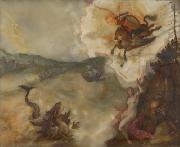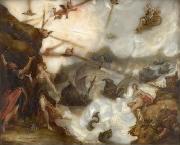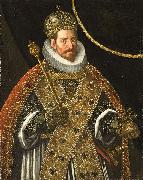Hans von Aachen Huiler la Reproduction de TableauAll Hans von Aachen Oil Paintingswas a German mannerist painter. His name is derived from the birth place of his father, Aachen in Germany. Other variations of the name include Johann von - and - von Achen and various concisions like Janachen, Fanachen, Abak, Jean Dac, Aquano, van Aken etc. Hans von Aachen began painting in Germany as a pupil of the Flemish master E. Jerrigh. He then moved to Italy in 1574 to study further. He toured Rome and Florence, but eventually settled in Venice. He initially became a pupil of Kaspar Rems, but soon decided to develop his own mannerist technique, by studying Tintoretto and Michelangelo's followers. However, during all of his life he was influenced by the style of Bartholomeus Spranger and Hendrick Goltzius who dominated the art scene in Germany at the time. He returned to Germany in 1588 where he became well known as a painter of portraits for noble houses. He painted several works for Duke William V of Bavaria. He married Regina, the daughter of the composer Orlando di Lasso in Munich. In Munich he came into contact with the Imperial Court in Prague. In 1592 he was appointed official painter of Rudolph II, Holy Roman Emperor. However, Von Aachen only moved to Prague in 1601, where he stayed painting commissions from Emperor Rudolph II, and later from Matthias I. Amongst van Aachens pupils were Peter Isaak and Joseph Heinz. His works have been copied by Wolfgang Kilian, Dominicus Custos and Jan Sadeler. |
|||

|
|||
|
|
|||
|
||||||||||||
| Hans von Aachen was a German mannerist painter. His name is derived from the birth place of his father, Aachen in Germany. Other variations of the name include Johann von - and - von Achen and various concisions like Janachen, Fanachen, Abak, Jean Dac, Aquano, van Aken etc. Hans von Aachen began painting in Germany as a pupil of the Flemish master E. Jerrigh. He then moved to Italy in 1574 to study further. He toured Rome and Florence, but eventually settled in Venice. He initially became a pupil of Kaspar Rems, but soon decided to develop his own mannerist technique, by studying Tintoretto and Michelangelo's followers. However, during all of his life he was influenced by the style of Bartholomeus Spranger and Hendrick Goltzius who dominated the art scene in Germany at the time. He returned to Germany in 1588 where he became well known as a painter of portraits for noble houses. He painted several works for Duke William V of Bavaria. He married Regina, the daughter of the composer Orlando di Lasso in Munich. In Munich he came into contact with the Imperial Court in Prague. In 1592 he was appointed official painter of Rudolph II, Holy Roman Emperor. However, Von Aachen only moved to Prague in 1601, where he stayed painting commissions from Emperor Rudolph II, and later from Matthias I. Amongst van Aachens pupils were Peter Isaak and Joseph Heinz. His works have been copied by Wolfgang Kilian, Dominicus Custos and Jan Sadeler. |
||||||||||||
|
|
||||||||||||
| ID de tableau:: 67959 Kreuzigung Christi Kreuzigung Christi Year Deutsch: nach 1600 Technique Deutsch: Kupfer Dimensions Deutsch: 33 x 26 cm Year Deutsch: nach 1600 Technique Deutsch: Kupfer Dimensions Deutsch: 33 x 26 cm |
||||||||||||
|
|
||||||||||||
| ID de tableau:: 67993 Vertreibung aus dem Paradies Vertreibung aus dem Paradies Year Deutsch: nach 1600 Technique Deutsch: Alabaster Dimensions Deutsch: H. 25 cm x B. 21,5 cm Year Deutsch: nach 1600 Technique Deutsch: Alabaster Dimensions Deutsch: H. 25 cm x B. 21,5 cm |
||||||||||||
|
|
||||||||||||
| ID de tableau:: 67995 und auf der Reckseite die Entfesselung der Winde durch Aeolus und auf der Reckseite die Entfesselung der Winde durch Aeolus Year Deutsch: nach 1600 Technique Deutsch: Gemälde auf Alabaster Dimensions Deutsch: H. 38 cm Year Deutsch: nach 1600 Technique Deutsch: Gemälde auf Alabaster Dimensions Deutsch: H. 38 cm |
||||||||||||
|
|
||||||||||||
| ID de tableau:: 68002 und auf der Reckseite die Entfesselung der Winde durch Aeolus und auf der Reckseite die Entfesselung der Winde durch Aeolus Year Deutsch: nach 1600 Technique Deutsch: Gemälde auf Alabaster Dimensions Deutsch: H. 38 cm, Year Deutsch: nach 1600 Technique Deutsch: Gemälde auf Alabaster Dimensions Deutsch: H. 38 cm, |
||||||||||||
|
|
||||||||||||
| ID de tableau:: 68006 Matthias, Holy Roman Emperor Matthias, Holy Roman Emperor Year 1600-1625 Technique Oil on canvas Dimensions 104 X 80 cm Year 1600-1625 Technique Oil on canvas Dimensions 104 X 80 cm |
||||||||||||
|
|
||||||||||||
| Artiste précédent Artiste prochain | ||||||||||||
|
|
||||||||||||
|
Hans von Aachen was a German mannerist painter. His name is derived from the birth place of his father, Aachen in Germany. Other variations of the name include Johann von - and - von Achen and various concisions like Janachen, Fanachen, Abak, Jean Dac, Aquano, van Aken etc. Hans von Aachen began painting in Germany as a pupil of the Flemish master E. Jerrigh. He then moved to Italy in 1574 to study further. He toured Rome and Florence, but eventually settled in Venice. He initially became a pupil of Kaspar Rems, but soon decided to develop his own mannerist technique, by studying Tintoretto and Michelangelo's followers. However, during all of his life he was influenced by the style of Bartholomeus Spranger and Hendrick Goltzius who dominated the art scene in Germany at the time. He returned to Germany in 1588 where he became well known as a painter of portraits for noble houses. He painted several works for Duke William V of Bavaria. He married Regina, the daughter of the composer Orlando di Lasso in Munich. In Munich he came into contact with the Imperial Court in Prague. In 1592 he was appointed official painter of Rudolph II, Holy Roman Emperor. However, Von Aachen only moved to Prague in 1601, where he stayed painting commissions from Emperor Rudolph II, and later from Matthias I. Amongst van Aachens pupils were Peter Isaak and Joseph Heinz. His works have been copied by Wolfgang Kilian, Dominicus Custos and Jan Sadeler. |
||||||||||||
|
|
||||||||||||
|
CONTACTER DES Etats-Unis |





